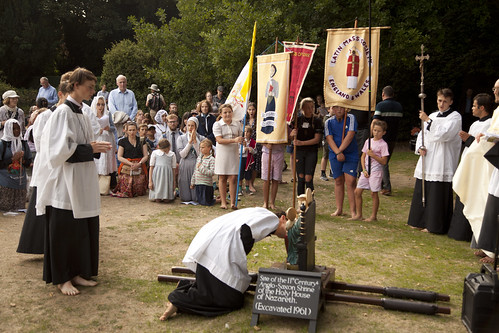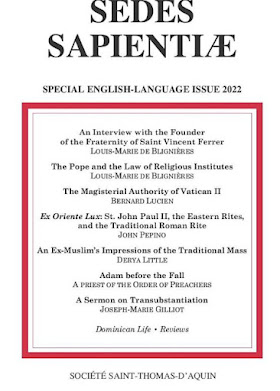Chairman's Blog
Farewell to St Benet's Hall
 |
| A Traditional Requiem Mass offered in St Benet's Chapel |
Children, Rigidity and the Synod
 |
| Mass at the St Catherine's Trust Summer School in 2022 |
He takes a rattle in his hands and pretends that he’s ringing the Sanctus bells (kneeling down and saying “ring, ring”) and swings his hands in front of him in the act of censing (“chk, chk!”). Where I was hardly aware of – and even distracted from – what was taking place in front of me during (Novus Ordo] Children’s Mass, my infant son is inspired by the traditional liturgy, his imagination fueled with enough images, sounds, smells and actions to take him through the week.My conversation partners, formerly quite talkative, received this account with a stony silence and shifting brows – some rose, some furrowed. The pause was broken by Shona, who wanted to add another problem to our list: “You know, we had a priest in our parish who caused a few people to leave. He wouldn’t accept any change, you see, and didn’t connect well with the people, especially not with the children. He was very set in his ways.” And that was that.
 |
| The conclusion of the LMS Walking Pilgrimage to Walsingham 2022 |
Home Education meeting in Reading Saturday 1st October
From 10:30, 338 Wokingham Road, Reading RG6 7DA
Support the Latin Mass Society
A Muslim convert encounters the Traditional Mass
This piece on Rorate Caeli is worth reading. It is from the journal of the Fraternity of St Vincent Ferrer, Sedes Sapientia, which is now available in English translation for the first time.
When I attended my first traditional Latin Mass years later [after her conversion, first to Protestantism and then to Catholicism] in an old English church with dark walnut pews, that reverence I had experienced during my very first Mass reached a new height where the reason for those tedious [Old Testament] details about worship became clear. This was a God before whom I could kneel; a God who held our existence in his hands, yet chose to humble Himself to become one of us and suffer humiliation and death in love to save us from our own sinfulness.
The Royal Prerogatives and the law: 1Peter 5 by James Bogle
Dear all, canon law makes it quite clear that the baptised of any denomination may be given a public requiem and that the final decision lies with the local Ordinary. Here is what canons 1183 & 1184 say:
"Can. 1183 §3. In the prudent judgment of the local ordinary, ecclesiastical funerals can be granted to baptized persons who are enrolled in a non-Catholic Church or ecclesial community unless their intention is evidently to the contrary and provided that their own minister is not available.
Can. 1184 §1. Unless they gave some signs of repentance before death, the following must be deprived of ecclesiastical funerals:
1/ notorious apostates, heretics, and schismatics;
2/ those who chose the cremation of their bodies for reasons contrary to Christian faith;
3/ other manifest sinners who cannot be granted ecclesiastical funerals without public scandal of the faithful.
§2. If any doubt occurs, the local ordinary is to be consulted, and his judgment must be followed."
The Queen was not an apostate, heretic or schismatic (one must first be a Catholic to meet those categories) nor was she a manifest sinner.
In addition, the local Ordinary has given permission.
IT IS THEREFORE ALLOWED.
THAT IS THE END OF THE MATTER.
Now, for goodness sake, find something more sensible to argue about.
Protestant Traditionalists: Letters in The Tablet
 |
| LMS Walking Pilgrimage to Walsingham this year |
Indifferentism and Praying for the Queen and the King
 |
| Cardinal Bernard Griffin, centre |
Launch of Family & Life Academy
I am pleased to announce the launch of a new online learning opportunity in which I am involved: the Family and Life Academy, a project of
Voice of the Family.
Some readers may know Voice of the Family through their magazine Calx Mariae.
The Academy lets you watch courses of weekly lectures at a very affordable price, either live or recorded, plus free webinars on various subjects. There are courses on Natural Law (from me), Divine Law (from Fr Thomas Crean), the moral issue of abortion (from the veteran pro-life activist John Smeaton). There will be special appearances by His Excellency Eduard von Habsburg and Roberto Mattei.
Here is their announcement with more details and links.
We are delighted to announce that enrolment is now open for Voice of the Family’s new online learning platform, the Family and Life Academy: dedicated to providing authentic Catholic formation in an extensive range of subjects relating to the defence of life and the family in today’s world. Visit www.familyandlifeacademy.com to explore our programme for the coming months and sign up for updates on the curriculum and important online events.
Starting in October, the Family and Life Academy will provide comprehensive courses and free webinars in a live virtual classroom, with academics and other educators handpicked for their specific expertise. Every live lesson and webinar is followed by a Q&A, in which all participants are invited to participate. A video of each session will be available on demand from the next day.
We are honoured that His Excellency Eduard Habsburg will open the Family and Life Academy’s programme on 7 October with a webinar on Blessed Karl and Empress Zita of Austria. This intimate look at the lives of two saintly heads of state in the twentieth century provides an insight into their holy marriage and heroic sacrifice, the action of the Holy Ghost in the fulfilment of their duties of state, and why Blessed Karl and Servant of God Zita are a perfect model for families and for whole nations.
From Tuesday 11 October, Dr Joseph Shaw will teach a six-week course on natural law, going back to its roots in ancient Greek and Roman philosophy, taking us through its development in Christian thought, up to its definitive formulation by St Thomas Aquinas in the thirteenth century. Dr Shaw will also look at some of the moral theories which took its place in the eighteenth century, and their consequences for morality today. This in-depth course will give a step-by-step plan of the moral law written on the human heart, and present the case for returning to the solid ground of the natural law tradition, in order to respond to contemporary challenges.
Click here to see all the Family and Life Academy’s upcoming courses and free webinars
From Thursday 13 October, John Smeaton will teach a six-week course on abortion. He will be joined by Dr Greg Pike, who will begin the course with an authoritative overview of the scientific evidence regarding the development of life before birth, compiled from some of the best peer-reviewed studies in recent decades. Then John Smeaton, drawing on five decades of experience on the frontline of the battle against legalised abortion, will explore the spiritual aspects of the fight, take a closer look at the key figures, events and cultural forces which have shaped it, and consider the role which the Catholic laity has played in the defence of the unborn, and the responsibility of the Catholic hierarchy in leading it to ultimate victory, and to the triumph of the Immaculate Heart of Mary.
We are pleased to be joined by Professor Roberto de Mattei on 18 November, when he will present a webinar giving a historical overview of the revolutionary attacks against the family, from the fifteenth century to our own day. The next day, on 19 November, Dr Alan Fimister will start a five-week course on the role of parents as the primary educators of their children, while Fr Thomas Crean OP will teach a six-week course on divine law from 24 November.
Click here to see some of the Academy’s teachers
Catholic parents today face the huge challenge of raising their children at a time when educational institutions fail to foster serious moral formation. Furthermore, many in authority in the Church appear to have abandoned their clear teaching voice, leaving the faithful without firm moral support. Catholic families, deprived of essential help, often lack the tools necessary to carry out their God-given mission to educate the new generation of Catholics.
The deep crisis in the Church and in the world today can only be overcome by a renewed commitment to our Catholic faith. The curriculum of the Family and Life Academy has been designed with a view to providing young people, parents, pro-life and pro-family advocates and all the faithful with the tools necessary to develop their understanding of life and family issues in the light of the unchanging teaching of the Church; and, ultimately, to know and love better “the victory which overcometh the world, our faith” (1 Jn 5:4).
The last seventy years have seen unparalleled moral confusion in society, and confusion in the Church on an even deeper level. We at Voice of the Family believe that Catholics must lead the way in restoring moral order in society, which means recovering the spirit of prayer and a deeper understanding of the Church’s moral teaching. By helping the faithful to grasp the contemporary relevance of critical moral principles handed down by the Church, we hope to rebuild a culture in which our Catholic faith is not only believed but lived.
We look forward to embarking on this new apostolate and ask your continued help and prayers for our work in restoring traditional Catholic teaching, “to re-establish all things in Christ” (Eph 1:10).
Watch a short video trailer here.
King and Father as Sacred Offices: from the European Conservative
Here is another piece (links to the other two) I have written on the monarchy, which was published in the European Conservative on the occasion of Queen Elizabeth's Jubilee. It was in the print edition but is just now available online.
Perhaps the Queen’s most remarkable achievement is that, by accepting this [her role] so absolutely, she has gained a deeper fulfilment than if she had rebelled. She has become what she has tried to be. People who know her well say there is always an air of peace surrounding her. To use a phrase below the level of events, she has job satisfaction.
Read the whole thing there.
Two pieces on the Monarchy
 |
| Queen Elizabeth II at her coronation in 1953 |
I have written two pieces on the British Monarchy for US-based sites: Catholic Answers and 1Peter 5. I think a lot of Americans find it difficult to get their heads round the monarchy, even conservative Catholics.





